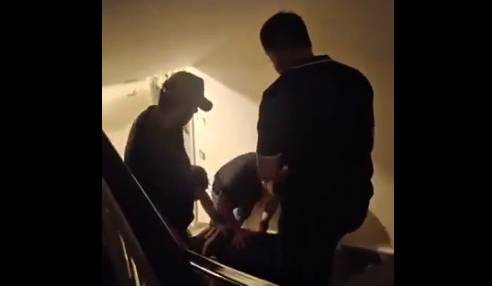A recent incident involving the arrest of a cartoonist associated with the satire magazine LeMan has sparked widespread condemnation from various human rights groups. The cartoonist, known only by the initials D.P., was detained following accusations of depicting Islamic prophet Muhammad and Jewish prophet Moses in a cartoon published in the magazine’s June 26 issue. The police raid, during which D.P. was apprehended, has been criticized for excessive force, raising significant concerns regarding freedom of expression and the treatment of detainees in Turkey.
| Article Subheadings |
|---|
| 1) Arrest Following Controversial Cartoon |
| 2) Human Rights Organizations Speak Out |
| 3) Allegations of Torture |
| 4) Political Implications and Wider Context |
| 5) Reaction from Medical Associations |
Arrest Following Controversial Cartoon
The recent arrest of the cartoonist D.P. can be traced back to an issue of LeMan published on June 26, which reportedly contained a cartoon depicting religious figures. The Interior Minister condemned the cartoon as a “vile drawing,” prompting authorities to launch a legal investigation. During a police operation, D.P. was captured along with four other staff members, including the graphic designer, accounting manager, editor-in-chief, and managing editor of the magazine. This swift action highlights the increasing tension surrounding freedom of expression in Turkey, particularly for those involved in satire and political commentary.
Human Rights Organizations Speak Out
Following the arrests, several human rights organizations issued stark criticisms regarding the police conduct during the raid. The Human Rights Association expressed outrage, stating,
“We condemn both the treatment during the arrest of the person alleged to have drawn the cartoon published in LeMan and the way these images were promoted by the Interior Minister to legitimize such treatment.”
The organization emphasized that the mistreatment was not only a violation of Turkish domestic law but also contravened international treaties and standards like the UN’s Mandela Rules. They urged the public and authorities to engage in respectful dialogue regarding freedom of expression.
Allegations of Torture
The İstanbul branch of the Progressive Lawyers Association criticized the treatment of the cartoonist and other detained staff members as tantamount to torture. They indicated that the footage of the arrest, showing individuals in reverse handcuffs and being dragged by police, provided clear evidence of mistreatment. They asserted that despite the alleged crime being minor, authorities subjected the staff to severe degradation.
“While our members followed the interrogation process… we will not allow the exoneration of the officers involved,”
stated the organization. Their comments reflect a broader concern regarding the rule of law and the treatment of detainees in the current political climate.
Political Implications and Wider Context
The broader implications of this incident reveal a concerning trend in Turkish politics. Critics argue that the arrests represent not just a localized issue of free expression but also reflect a systematic targeting of dissent by the governing authorities, specifically the AKP-MHP coalition. Accusations from the Progressive Lawyers Association suggest that the Interior Minister’s promotion of the arrest footage falls within a political strategy to intimidate and control the media landscape in Turkey. The investigation into LeMan magazine is seen as part of a larger push to suppress artistic expression that strays from governmental narratives, igniting fears of increasing censorship.
Reaction from Medical Associations
The İstanbul Medical Chamber (İTO) also condemned the manner in which the arrests were conducted. They noted,
“Individuals who offered no resistance were reverse-handcuffed, dragged on the ground, and forced to walk barefoot during detention.”
Such practices have been deemed illegal under both Turkish law and various international agreements. In their statement, the İTO emphasized the need for respect for differing values regarding freedom of expression. Their involvement underlines how the situation transcends mere political discourse, extending into the ethical responsibilities of law enforcement and public health implications.
| No. | Key Points |
|---|---|
| 1 | The cartoonist D.P. was arrested for a controversial cartoon depicting religious figures, drawing criticism for the police’s use of force. |
| 2 | Human rights organizations, including the Human Rights Association and the Progressive Lawyers Association, condemned the police actions as excessive and torturous. |
| 3 | Authorities’ actions have raised significant concerns regarding freedom of expression and artistic autonomy in Turkey. |
| 4 | The arrests highlight a growing trend in political oppression, targeting dissent and artistic expression by the Turkish government. |
| 5 | Medical associations have also decried the treatment of detainees, emphasizing its violation of legal standards and ethical norms. |
Summary
The arrest of cartoonist D.P. and four other staff members from LeMan magazine marks a significant episode in the ongoing struggle for freedom of expression in Turkey. As human rights advocates decry the excessive force employed during the apprehensions, this incident has sparked a broader dialogue about the state of artistic expression and dissenting voices under a politically charged atmosphere. The reactions from various organizations underscore the urgent need for a reassessment of policies governing freedoms in Turkey.
Frequently Asked Questions
Question: Who is D.P.?
D.P. is the cartoonist from the satire magazine LeMan who was arrested for depicting religious figures in a controversial cartoon.
Question: What charges were brought against the cartoonist?
The cartoonist was detained following allegations that his cartoon depicted the Islamic prophet Muhammad and Jewish prophet Moses, which led to a legal investigation.
Question: How have human rights organizations responded?
Human rights organizations have condemned the police actions as excessive and criticized the treatment of the detainees, emphasizing the need for adherence to legal standards and protection of freedom of expression.


